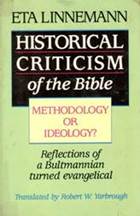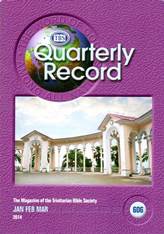FROM SCIENCE TO FAITH
Testimony of Prof Eta Linnemann (1926-2009)

“Why do you say ‘No” to historical-critical theology?” I have been confronted with this question, and I wish to state at the outset: My “No!” to historical-critical theology stems from my “Yes!” to my wonderful Lord and Saviour Jesus Christ and to the glorious redemption he accomplished for me on Golgotha.
As a student of Rudolf Bultmann and Ernst Fuchs, as well as Friedrich Gogarten and Gerhard Ebeling, I had the best professors which historical-critical theology could offer to me. And I did not do too badly in other respects, either. My first book turned out to be a best-seller. I became professor of theology and religious education at Braunschweig Technical University, West Germany. Upon completing the rigorous requirements for a university lectureship, I was awarded the title of honorary professor of New Testament in the theology faculty of Philipps University, Marburg, West Germany. I was inducted into the Society for New Testament Studies. I had the satisfaction of an increasing degree of recognition from my colleagues.
Intellectually comfortable with historical-critical theology, I was deeply convinced that I was rendering a service to God with my theological work and contributing to the proclamation of the gospel. Then, however, on the basis of various observations, discoveries, and a resulting self-awareness, I was forced to concede two things I did not wish: (1) no “truth” could emerge from this “scientific work on the biblical text,” and (2) such labor does not serve the proclamation of the gospel. At the time this was just a practical realization emerging from experiences which I could no longer deny. Since then, God through his grace and Word has given me insight into the theoretical dimensions of this theology. Instead of being based on God’s Word, it had its foundations in philosophies which made bold to define truth so that God’s Word was excluded as the source of truth. These philosophies simply presupposed that man could have no valid knowledge of the God of the Bible, the Creator of heaven and earth, the Father of our Saviour and Lord Jesus Christ.
Today I realize that historical-critical theology’s monopolistic character and world-wide influence is a sign of God’s judgment (Rom. 1:18-32). God predicted this in his Word: “For the time will come when men will not put up with sound doctrine. Instead, to suit their own desires, they will gather around them a great number of teachers to say what their itching ears want to hear” (2 Tim. 4:3). He also promised to send “a powerful delusion so that they will believe the lie” (2 Thess. 2:11). God is not dead, nor has he resigned. He reigns, and he is already executing judgment on those who declare him dead or assert that he is a false god who does nothing, either good or evil.
Today I know that I owe those initial insights to the beginning effects of God’s grace. At first, however, what I realized led me into profound disillusionment. I reacted by drifting toward addictions which might dull my misery. I became enslaved to watching television and fell into an increasing state of alcohol dependence. My bitter personal experience finally convinced me of the truth of the Bible’s assertion: “Whoever finds his life will lose it” (Matt. 10:39). At that point God led me to vibrant Christians who knew Jesus personally as their Lord and Saviour. I heard their testimonies as they reported what God had done in their lives. Finally God himself spoke to my heart by means of a Christian brother’s words. By God’s grace and love I entrusted my life to Jesus.
He immediately took my life into his saving grasp and began to transform it radically. My destructive addictions were replaced by a hunger and thirst for his Word and for fellowship with Christians. I was able to recognize sin clearly as sin rather than merely make excuses for it as was my previous habit. I can still remember the delicious joy I felt when for the first time black was once more black and white was once more white; the two ceased to pool together as indistinguishable gray.
About a month after entrusting my life to Jesus, God convinced me that his promises are a reality. I heard the report of a Wycliffe [Bible Translators] missionary who served in Nepal. He reported that while he was away, his newly converted language helper was thrown into prison because it is illegal to become a Christian in Nepal. He also reported what this new Christian said at his trial. On the basis of earlier reports which I had heard about this language helper, it instantly became evident that he could never have given such an answer merely on the basis of his own ability. Mark 13:9-11 surged before my eyes—a passage of which I had earlier taken note with only academic interest—and I had no choice but to admit that here was a fulfillment of this promise.
Suddenly I was convinced that God’s promises are a reality, that God is a living God, and that he reigns. “For he spoke, and it came to be; he commanded, and it stood firm” (Ps. 33:9). All that I had heard from testimonies in recent months fell into place at that moment. I became aware of what folly it is, given what God is doing today, to maintain that the miracles reported in the New Testament never took place. Suddenly it was clear to me that my teaching was a case of the blind leading the blind. I repented for the way I had misled my students.
About a month after this, alone in my room and quite apart from any input from others around me, I found myself faced with a momentous decision. Would I continue to control the Bible by my intellect, or would I allow my thinking to be transformed by the Holy Spirit? John 3:16 shed light on this decision, for I had recently experienced the truth of this verse. My life now consisted of what God had done for me and for the whole world—he had given his dear Son. I could no longer brush this verse aside as the nonbinding, meaningless theological assertion of a more-or-less gnostic writer. Faith can rest on God’s binding promise; speculative theological principles are of merely academic interest.
By God’s grace I experienced Jesus as the one whose name is above all names. I was permitted to realize that Jesus is God’s Son, born of a virgin. He is the Messiah and the Son of Man; such titles were not merely conferred on him as the result of human deliberation. I recognized, first mentally, but then in a vital, experiential way, that Holy Scripture is inspired.
Not because of human talk but because of the testimony of the Holy Spirit in my heart, I have clear knowledge that my former perverse teaching was sin. At the time I am happy and thankful that this sin is forgiven me because Jesus bore it on the cross.

That is why I say “No!” to historical-critical theology. I regard everything that I taught and wrote before I entrusted my life to Jesus as refuse. I wish to use this opportunity to mention that I pitched my two books Gleichnisse Jesu … and Studien zur Passionsgeschichte, along with my contributions to journals, anthologies, and Festschriften. Whatever of these writings I had in my possession I threw into the trash with my own hands in 1978. I ask you sincerely to do the same thing with any of them you may have on your own bookshelf.
Source: Eta Linnemann, Historical Criticism of the Bible: Methodology or Ideology? Reflections of a Bultmannian Turned Evangelical, trans Robert W Yarbrough (Grand Rapids: Baker, 1990).
DEFENDING VPP: CAINAN IN LUKE 3:36 IS NOT A SCRIBAL ERROR
We who believe in the Verbal Plenary Inspiration (VPI) and Verbal Plenary Preservation (VPP) of the Holy Scriptures do not believe there are any mistakes in the Bible. The Bible is 100% perfect without any mistake not only in the past but also in the present. God’s Word is forever infallible and inerrant.
In Luke 3:36, we find the genealogy of Jesus containing a name (“Cainan”) that is not found in the genealogies of the Old Testament (Gen 10:24, 11:12, 1 Chron 1:18). Cainan in Luke 3:36 is the father of Sala and the son of Arphaxad., but this is not how it reads in the Old Testament.
There are Christians who call this apparent discrepancy in the Bible a “scribal error”. They do not consider “Cainan” to be in the originally inspired text of Luke 3:36. We who believe in VPI and VPP, on the other hand, believe that “Cainan” is Scripture and not a scribal error. It has been our contention all along that such passages do not contain scribal errors. We believe we have strong doctrinal reasons and historical evidences to back this up. When one thinks carefully enough, the “scribal errors” solution is really no solution at all. In fact it does the opposite; it undermines the authenticity and inerrancy of the Scriptures we have in our hands today.

We are thankful that the Trinitarian Bible Society (TBS), in its latest Quarterly Record (Jan-Mar 2014, pp22-27) published an article addressing this issue—“The Apparent Cainan Contradiction in Luke 3.36.” It comes from the pen of its Senior Editorial Consultant—Larry Brigden. Brigden defends the inclusion of “Cainan” in Luke 3.36. He maintains that such a position “is more consistent with the doctrine of the divine preservation of the Holy Scriptures and the available evidence.” He went on to say that the “scribal error” view “implicitly impugns the doctrine of the divine preservation of the Scriptures.” The TBS believes the “Masoretic Hebrew and the Greek Received Texts are the texts that … have been preserved by the special providence of God within Judaism and Christianity.”
There are good reasons why “Cainan” should be taken as God’s word and retained in Luke. Read Brigden’s article in the latest TBS Quarterly Record. Get your free copy at the reception table. JK
VERSE FOR THE WEEK
“The prince that wanteth understanding is also a great oppressor: but he that hateth covetousness shall prolong his days.” Prov 28:16


